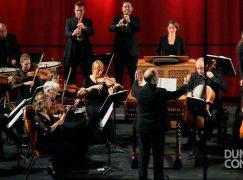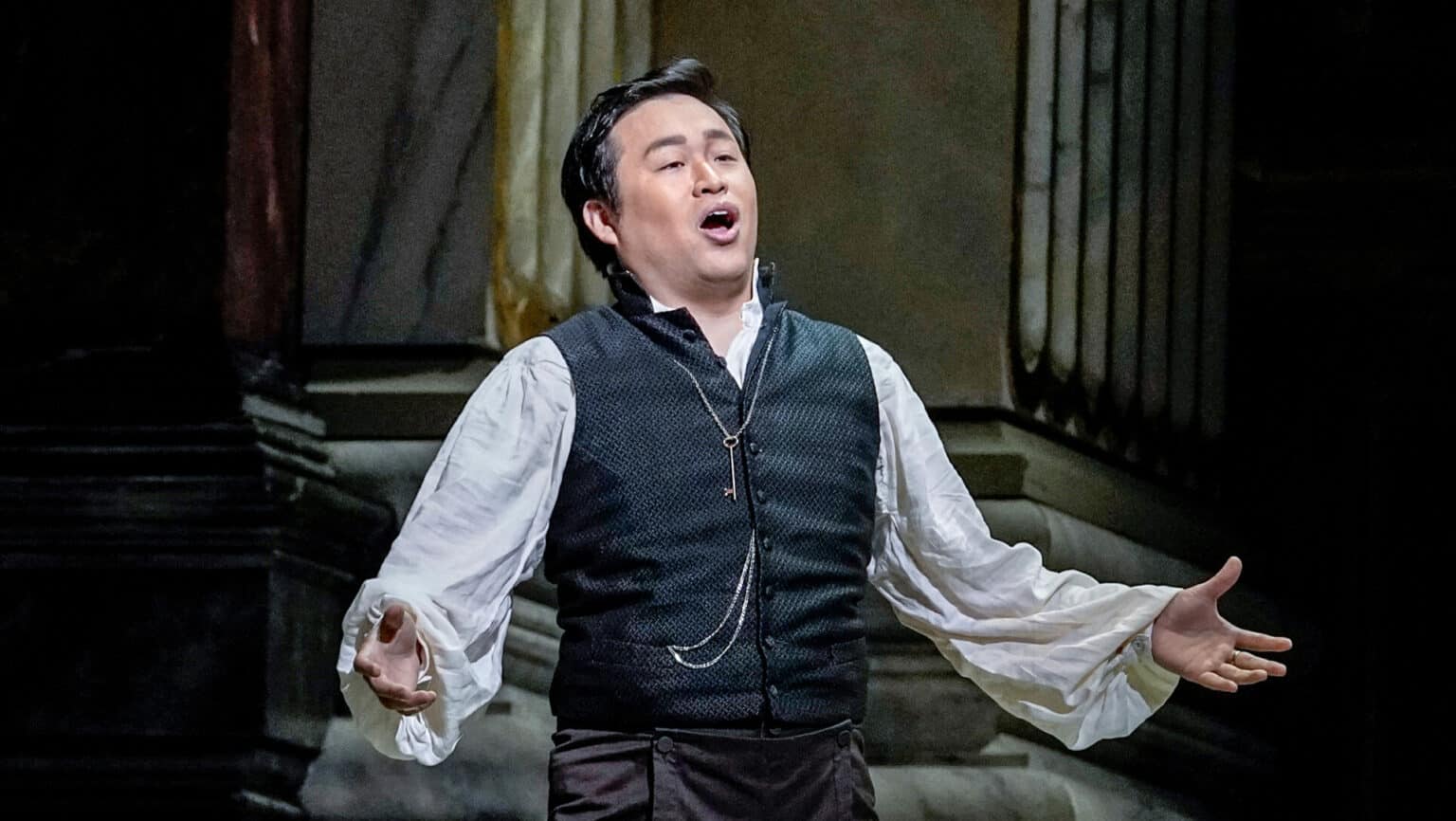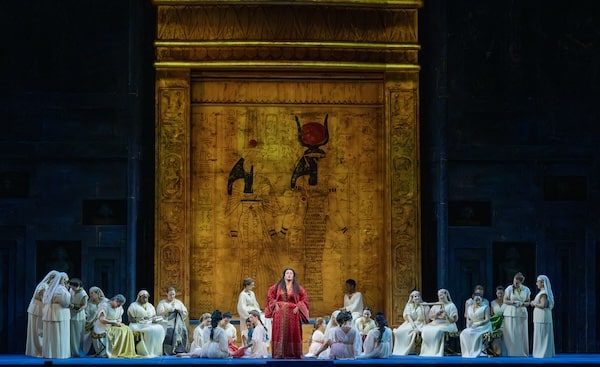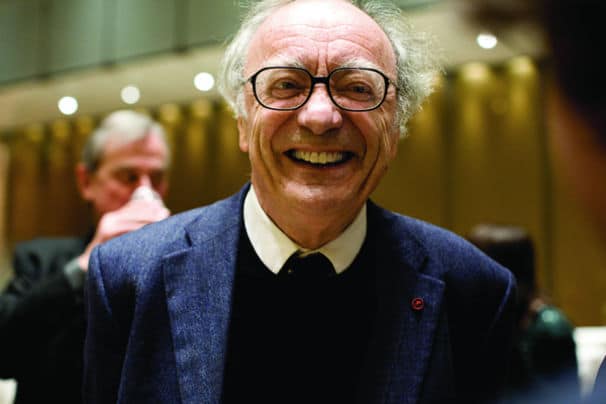Just in: Scotland defunds its premier baroque ensemble
mainCreative Scotland has removed the Dunedin Consort from its list of Regularly Funded Organisations for 2018-21.
The Consort is internationally renowned. Here’s its statement:
As Scotland’s leading specialist period instrument ensemble, and the most decorated of any Scottish music company (with two Gramophone awards, a Grammy nomination and two Scottish Album of the Year nominations to our name), this comes as a significant disappointment. In the landscape of Scotland’s musical culture, no other organisation focuses on this vital area of the repertoire, uniting excellence in scholarship and performance to explore new ways of encouraging listener engagement. Dunedin Consort has achieved great success with very limited resources. Our artistic output, recognition in the industry and impact in the international and national music landscape in proportion to the level of funding and our turnover, cannot be matched by any other music company in Scotland.
Creative Scotland … funding currently accounts for 20% of our annual turnover (other music organisations receive 32-82%) representing exceptional value for public money and without it, Dunedin Consort will be forced to capitalise more on its opportunities elsewhere. This, in turn, will reduce the performance opportunities for our Scottish audiences and supporters, including the valuable outreach work we undertake in schools and with young performers. … Our national and international profile continues to develop – only yesterday we confirmed a further seven concerts in our residency at London’s Wigmore Hall, which sits alongside residencies at the Misteria Paschalia festival in Krakow and the Handel Halle Festpiele in Germany in 2018, and tours planned for Spain, France, Bolivia, Brazil, the USA and others over the next three years. Without support at home, this international impact – vital to Scotland’s reputation – must be at risk. What is certainly clear, is that the lack of Creative Scotland commitment will mean that it will not be possible to match this international demand with performances on home soil.

UPDATE: Edinburgh Fringe is also defunded.
UPDATE2: As is the Hebrides Ensemble, which performs contemporary music.
UPDATE3: Dunedin gets its funding back





There are people on these Creative Scotland panels deciding on these matters who don’t know what the word ‘baroque’ means.
This is the third Scottish artistic endeavour I’ve heard of this week which will be losing significant, if not all, funding. Scotland will become a cultural desert if we don’t make our voices heard. I’m utterly appalled.
Baffled as I too am (and the orchestra I direct artistically is to all intents and purposes in competition with the Dunedins, but I stand right with them here), that a fine, go-ahead, sometimes trail-blazing, certainly internationally-renowned and definitely excellent ensemble that from its website provably does great work in its home territory, Scotland (and does educational as well as performing work, so it surely ticks that box too), should be denied regular funding like this, it seemed fair to check who made the decisions.
And, taken from the Creative Scotland website, here is the answer:
[Q:] Did anyone beyond Creative Scotland staff and Board, and Local Authorities (where appropriate), play any part in the assessment or decision making process?
[A:] Beyond the seeking of comments from Local Authorities (where appropriate), all the assessments and decisions were taken by Creative Scotland staff, Senior Leadership Team and were approved by the Creative Scotland Board. No external assessors were used in the decision-making process.
The senior decision makers are listed at
http://www.creativescotland.com/who-we-are/our-people/senior-leadership-team
You can also download as an Excel file the list of organisations who were successful (and the amounts they received) at:
http://www.creativescotland.com/funding/latest-information/funded-organisations/regularly-funded-organisations-2018-21/the-regular-funding-network-2018-21
Make of all this what you will. As an outsider, presumably some buro-requirement wasn’t buro’d to the buro-standards required, but on reputational and musical grounds this has to be one of the more curious decisions of the year. Much sympathy for the Dunedins: let’s hope that a fine benefactor quickly steps in and makes up for this lost funding.
The biog for the fine gentleman who “leads on music at Creative Scotland”, so presumably had some influence in the Dunedin’s unfunding, reads:
After studying English Language and Literature at the University of Edinburgh, [xx] spent more than 25 years in arts journalism. With an initial specialisation in film, he has held the positions of Editor of The List, Associate Editor of Total Film, Reviews Editor of Empire and film critic of The Daily Record. He was also the Artistic Director of the Kirkcaldy Film Festival from its inception until 2016.
As Group Arts Editor across all titles in the Herald & Times Group, he spent the better part of a decade championing the Scottish arts scene in print, particularly music in the Sunday Herald and The National. He instigated the Sunday Herald’s cross-genre Top 50 Scottish Albums of the Year list and spent many years on the jury selecting unsigned bands for the T Break at T in the Park. In his early days, [xx] played violin with the Central Region Youth Orchestra and Scottish Schools Fiddle Orchestra, sang regularly in end-of-term stage musicals and spent a couple of happy but unproductive years in a teenage rock band after teaching himself guitar.
He replaced a professional musician ,Ian Smith,who played in the RSNO and then became a highly respected and innovative Musician’s Union lead in Scotland. In short Creative Scotland moved from a maker to a spectator to “lead” on music.
Robert, I don’t know of a public funding system anywhere ( and you would surely know this too) that doesn’t operate at arms length from government oversight, i.e. based on a seperation of powers. I think that’s what the Q&A you’re referring to means.
The system has it’s pros and cons, but in this case those who made the decision clearly don’t see early music as the priority that of course you do, given that it’s your field. I don’t necessarily like it either, but I can certainly see where they’re coming from. Early music, intrinsically has nothing much new to say, and is therefore likely to be a tough sell, in the current climate especially.
So you want to 86 this thriving little band for the sake of some unholy combination promising to present what’s “new to say”?!” The new-to-say that prompts even aging audiences to sprint for the exits, canes, single shoes, dropped programs left in their wake?
Baroque bands keep alive in the minds of their listeners, among many other good things, the promise and the glory of formal counterpoint. Maybe one day, though not for sure, some large-brained person with “something new to say” will manage to say it through such means, in a manner which thrills us, and not repels.
You think that ship has sailed? Listen to Shostakovich’s Op 87 “24 Preludes and Fugues for Piano” and again until it takes hold, which it surely will.
That’s what I think is at stake.
Dear David, always happy to have a rational and considered discussion with someone like your good self. We both, I think, spend quite a lot of time playing “devil’s advocate”, trying to argue a point from the opposite viewpoint, so that we can more robustly test our own beliefs and theories.
On the people making the decision, I wholly agree that arts funding should be made at arms length from government. Sir Humphrey would have had a seizure had there been an arts minister who knew anything about the subject (and in real life they rarely stay in post for long anyway, soon being moved to something completely different). It just seems to me – a geographical outsider, despite a fair amount of Scottish blood in my veins – somewhat surprising that such major funding decisions (many tens of millions are distributed by Creative Scotland [CS] ) are made entirely by “insiders” – the officers of the organisation – with no external, independent voices maybe providing an alternate view. In a large company with a similar budget of many tens of millions, you would have company directors who are in there, day-in day-out, but also then (to bring a wider perspective) some non-executive directors, with knowledge and experience from elsewhere. Now we know that CS relies solely on its own officers’ judgement.
If we are to suggest that music written in the past is not to be funded (a perfectly fair set of rules if those are to be the rules), then CS should by that argument not fund any company doing anything artistic from the past. So out goes Shakespeare (will some of the theatres CS fund be in trouble?), out go ballets written by choreographers from 30 years ago (ditto?), out go orchestras or ensembles who play Mozart, Beethoven, or Mahler (ditto?), or anyone who performs or shows anything by anyone who’s dead. Then announce that CS funding will – right across the board – be only for new, contemporary work, stuff that is wholly newly created. That’s fine – it may be a bit limiting for many audiences, but let’s shake ’em up!
Finally, to suggest that period instruments don’t provide anything new is surely a slightly narrow argument. In this specific case, look at what the Dunedins have done to recreate events and performances (quite possibly for the first time since the composers themselves did it 250+ years ago). Isn’t that actually also “new” work for today’s audiences? More widely, even if someone hates the ethos and philosophy of historical performance practice (as did a former, now dead, prime minister who “knew something about music”, who graced me after a short concert with just one fine sentence: “I hate period instruments”, and turned his grumpy old back on me), even the most extreme of them surely now have to acknowledge what period instrument performance practice has done (if nothing else) to influence the outlook and playing of “modern” instrument orchestras (half of whose players nowadays are brilliant exponents on both “old” and “new” instruments and regularly cross over), and with world-class musicians such as Rattle or Jurowsky as happy to conduct “period” as they are “modern” instruments. Is it any less valid to recreate, say, for the first time since 1833, a performance of Mendelssohn recreating Handel (a wholly new work for today’s audiences) as it is to create a wholly new work for today’s audiences? Both are new to our audiences, as no-one living has heard either work before. Aren’t both performances worth doing, if they stimulate, move, challenge, delight, annoy, enrich, and everything else that the arts are there to do for humanity?
But that’s the arts, and here we are talking arts funding. A very different sphere, but one that in this case, rather splendidly, is proving to be just as controversial.
All good arguments Robert, and mostly, I agree. Especially when we’re talking about definitions of ‘newness’. I really hope that we can find a way of moving forward without tossing aside too much of the good things we have already.
Historically informed performance has always fascinated me, especially in the way that it has evolved. On that subject, you might find this interesting, I certainly did.
https://www.youtube.com/watch?v=K1KiGdia5TY
That’s a reasonable point.
Its an enormous problem at a time of intense political populism to demand ring fencing of state funding for niche classical projects, particularly if the grants are large. One of the reasons I’ve argued that arts organisations here in Ireland need to do a lot more to cultivate a broader audience, not simply because of ticket revenue but to nullify the apathy if organisations are pushed to the point of failure because of a sudden funding cut.
There was an extremely interesting and uncomfortable debate in Ireland a few years ago about how funding for classical projects were ring fenced under the category of “non commercial” at a time when more popular music genres were not viable either. That said, the model is perfect nowhere (not even in Germany, where high funding is also matched by often very high ticket prices and difficulty in obtaining even these tickets)
Very good points here.
At least the Dunedin Consort has the standing to be able to make up the loss of Creative Scotland funding by touring abroad. (I’ve been waiting for years for them to come to New York.)
I can’t help wondering if that fact – that they can earn money touring that less well-known groups can’t – somehow figured into the decision to cut their Creative Scotland funding.
In any case, this won’t cause the group to disband, thank goodness.
re the situation in Germany:
while you are correct that it can be difficult to obtain tickets for certain performances at a few world class venues at times, I cannot agree to your point in general.
just as any example, I have randomly looked at two respectable companies:
staatstheater nürnberg for opera, and
stuttgarter philharmoniker for concerts.
tickets are easily available and prices range from 10 to 86 euros and 7 to 36 euros, respectively.
the vast majority of publicly funded classical music and opera performances all over Germany are affordable (additionally with reduced prices for students, seniors, disabled, …) and easily accessible.
We’ve had that debate, (still unresolved) just about everywhere Laura. Germany is an intriguing case study in itself, given that loads of money, plus highly decentralised decision making, should in theory add up to a thriving, diverse creative sector.
In Germany unfortunately, the money in far too many cases has become a bulwark against change, used primarily to prop up the established order, with often disastrous consequences. There are exceptions, one shining example perhaps is Deutsche Oper Am Rhein, but overall we have a system that has demonstrably failed, and I really mean demonstrably, with very little possibility even of open debate, let alone things getting better any time soon.
Identify what the problem is in Germany, and I think we might go a long way towards coming up with a better way of doing things world-wide.
One thing however I cannot agree with you on is ticket prices, they seem to me to be very reasonable.
Saddened. Disgusted and absolutely bewildered by this decision.
Not good!
Yes, shock horror is a reasonable reaction, I certainly hope that this ensemble finds the resources to continue it’s work, but it’s probably worthwhile trying to dig a little deeper in order to work out the rationale behind such moves.
It’s not just that the funding pool is limited, I could imagine arguments along the lines of: Let me see, the world does not really lack fine early music ensembles, nor does what they do necessarily reflect a uniquely Scottish culture and it’s traditions; nor, if the ‘creative’ part of the funding organisation’s title is of any relevance, can it be argued that there is anything particularly creative about an early music ensemble.
Back in the old country, I recall similarly robust discussions over the major performing arts funding given to the Australian Brandenburg Orchestra, likewise a fantastic ensemble.
Overall, I think there are good arguments for change in the way the arts funding dollar is allocated and we probably do need to do better in our reactions than “that’s appalling” every time tough decisions are made.
Of course you’re right and this is the mature position. Even so…
You might consider that your argument can be used to wrap up most of the orchestras and chamber groups in the world that receive state funding, thanks to the miracle of recording.
I have another argument. Remember the wag who, bemoaning the 2nd Viennese School, predicted that the future of classical music would be its past?
There are many attributes to baroque music, including its small forces and short forms (eg preludes and fugues) that suit the present day, especially compared to the sonata form of the classical and romantic lit. There ought to be a good baroque ensemble just about everywhere, and not least where local governments have worshiped such false gods and means of salvation as Trump golf courses.
“That’s appalling!” will be the standard I shall wave.
So he taught himself guitar, did he? A regular Joe Strummer.
Anyone handed power of the purse over baroque music ought to have might better qualifications. How about ability to perform the Weiss sonatas, beautifully, and on the lute, dammit?!
https://www.youtube.com/watch?v=MDGcpMl8Ox8
I think this is just their way of saying they don’t have a music lead.
Glad I listened to that, staggeringly beautiful playing.
Great. Barto has recorded at least two dozen of the Weiss sonatas with another dozen (at least) on the way (Erato) — current status this project is somewhat hazy.
The Peres Da Costa lecture is fascinating. Mozart really sparkles. If only he could reach another 150 years further back…
Yes I know, probably nothing short of a time machine can help us there . From memory towards the end of the lecture he does make some (slightly) educated guesses though.
I do think he’s a little unfair to the HIP movement — it’s a lot more than instruments copied from museums, though even that clawed back a lot, I’m thinking especially of baroque oboes. There’s the restoration of turnings, especially Werkmeister 3,, which makes a huge difference; the rediscovery of (faster) tempi and reduced forces, the renewed focus on separating the voices, contrapuntal transparency. There’s Gardiner’s Monteverdian “Connect with the text!”. All this compared with say pre-1965. Try listening to Karl Richter’s Bm Mass or Matthew’s Passion on Archive.
But this talk showed me how amazingly much more may have been lost. Thanks again.
I wonder what impact if any this has had so far. It’s quite a challenge.
Contemporary music suffers as well, with the Hebrides Ensemble losing its funding.
https://www.scotsman.com/lifestyle/fury-as-fringe-and-theatre-companies-have-funding-axed-by-creative-scotland-1-4671604
If you disparove of this decision write to Scottish Ministers, pounting out the international achievements of the Dunedin Consort. Link it into the Scottish National outcomes – particularly in making Scotland a diverse place and a world class events destination.
This is a shocking decision. Dunedin are not just a Scottish ensemble but a European one and they have brought incredibly high standards to everything they do. I suppose this news won’t gain much attention in the mainstream media but it’s a further example of how Sturgeon and her cohorts are incapable of governing, beyond their own ideology.
Lawrence, as mentioned elsewhere in this thread, it is not governments that make these decisions. That’s just not the way it works and that, for the most part, is probably a good thing.
I don’t know how much knowledge you have of Scottish politics but there are certainly suspicions among some the arts community that the ‘arms length principle’ is not as robust in Scotland as it should be. I refer you to Sir James MacMillan, writing in today’s Times about how the nationalist government pressurises Creative Scotland into doing its bidding in terms of arts funding strategy. It should be added, of course, that Scotland’s so-called ‘national’ arts companies (including the Scottish Chamber and Royal Scottish National orchestras, Scottish Opera, and Scottish Ballet) are in fact funded directly by the Scottish government – there is no arms length principle at all there.
But while no-one is suggesting the SNP government intervened in specific funding decisions about particular companies it is right to be appalled by the decision on the Dunedin Consort. This is now recognised as one of the top three or four ensembles of its kind in the world. It has been showered with Gramophone and other awards and nominations for its Bach and Handel recordings. It is in demand at leading festivals round the world. It has a Wigmore Hall residency. It has, thanks to its artistic director John Butt’s high international standing as a Bach scholar, allied to his genius for stimulating performance, done genuinely pioneering work in Bach and Handel performance practice. It is, in short, currently THE most internationally acclaimed Scottish music ensemble of any kind. Yet, years of shoestring funding from Creative Scotland have meant that it has not been able to perform in Scotland nearly as much as its many admirers would like. Now, at best, that presence is likely to be reduced further – or, perish the thought, it might even eventually be forced to give up altogether.
A few posters here have tried to put forward arguments why this decision might actually be understandable. I can tell them it absolutely isn’t. No amount of Creative Scotland verbiage about having to follow their ‘strategic priorities’ can disguise the fact that this ensemble is a fantastic jewel in Scotland’s cultural crown whose achievements really could not be bettered and which should be prized and further nurtured. Instead, what they have done is underfunded it for years and now cut its regular funding altogether – the ultimate insult and betrayal.
Do calm down! This is only a very small part of the group’s funding and maybe it’s time another group got a look in with funding. Dunedin Consort is neither particularly representative of Scotland as most of its members live in London or abroad and neither is it ‘one of the top three or four of its kind in the world’. It is a group amongst many groups worthy of funding and is certainly peered by many more groups than you suggest. The funding was clearly deserved elsewhere.
No David, it’s not a good thing.
This is disgraceful. Do those in control of the money not realise what enormous benefits –
at home and elsewhere – Scotland gets from the Dunedin Consort.
Years ago, just after Scottish Opera produced a world-class Ring cycle, the company was forced to take drastic measures to cut costs. This was at the same time that the Scottish Parliament building was being built at enormous expense – in fact it was completed at no matter what the cost. Then there’s the Edinburgh trams fiasco…….
Not to worry. Scotland still has whisky.
Might it not simply be a matter of the fact that Creative Scotland wishes to back groups and ventures which have more to do with Scotland? The Dunedin Consort spends thousands of pounds bringing in foreign artists and London based musicians and has much less to do with Scotland than it used to. Its leader is Dutch and lives in Amsterdam and very few of its members are Scottish or live in Scotland.It would seem to me that Creative Scotland has made a valid and sensible choice here. What about the idea of sharing? Perhaps there are other groups/ ventures who now deserve their share of funding?
Yes, there are good arguments here on all sides but it has always been my position that, if you can’t fund everybody, the priority should be great ideas at startup when financial support is most required.
There has to be a point at which the established are able to some extent fend for themselves, not least because if you continue to favour the established over the new, you create a very lopsided playing field.
Getting the balance right is a huge challenge in an art-form where reliance on public funding is pretty much unavoidable and we are a long way from finding a path forward on this one really anywhere in the world.
But frank and open discussion is a damn good start. With that in mind at the very least we should all be grateful that we gave this forum.
I couldn’t agree more David- very well put.